Cyber Espionage and International Statutes
VerifiedAdded on 2022/11/14
|9
|3010
|450
AI Summary
This report will focus on the challenges that are encountered in trying to synthesis international statutes and vices relating to the cyber space, more specifically cyber espionage. The bone of contention is based on the fact that cyber espionage infringes on the sovereignty of states.
Contribute Materials
Your contribution can guide someone’s learning journey. Share your
documents today.
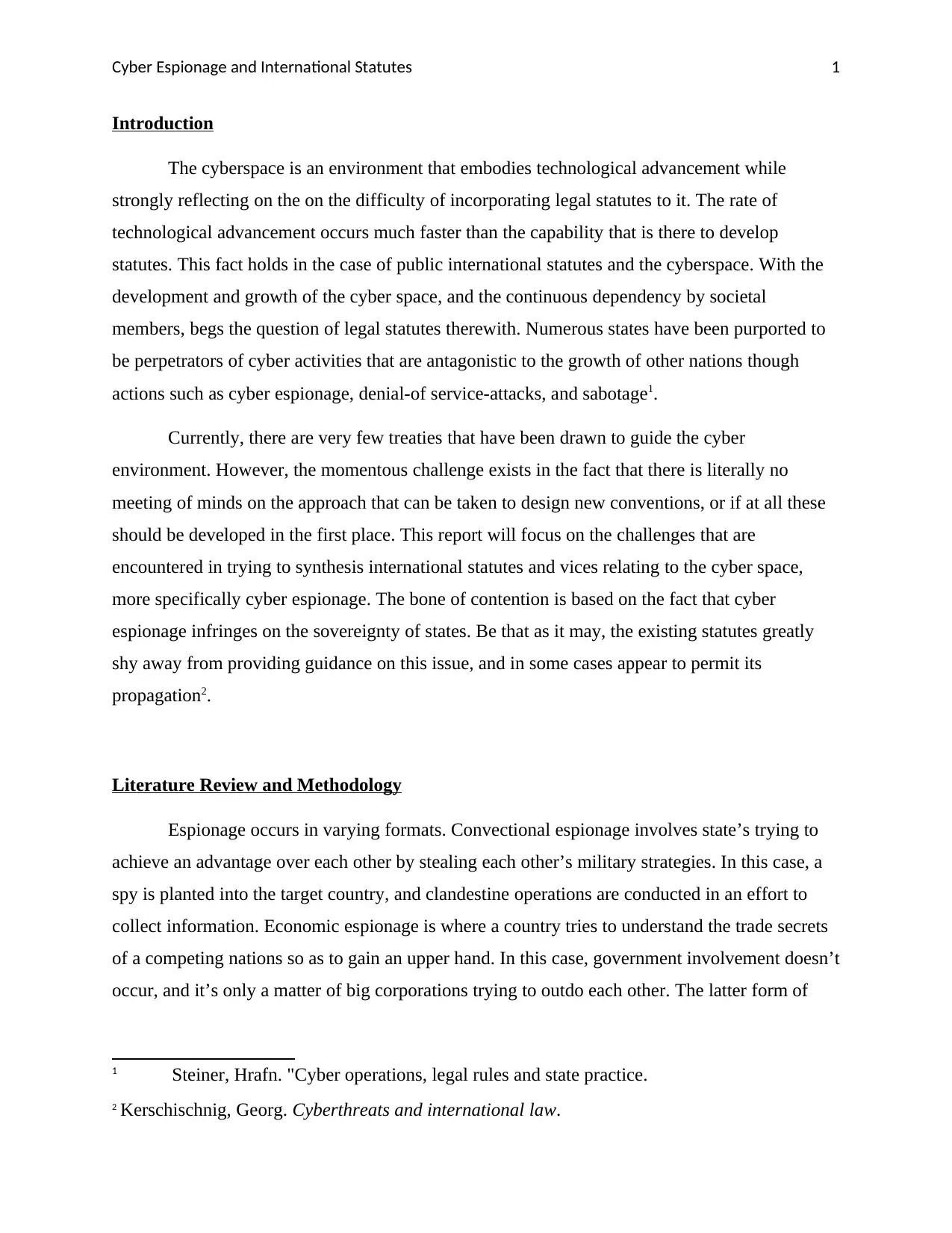
Cyber Espionage and International Statutes 1
Introduction
The cyberspace is an environment that embodies technological advancement while
strongly reflecting on the on the difficulty of incorporating legal statutes to it. The rate of
technological advancement occurs much faster than the capability that is there to develop
statutes. This fact holds in the case of public international statutes and the cyberspace. With the
development and growth of the cyber space, and the continuous dependency by societal
members, begs the question of legal statutes therewith. Numerous states have been purported to
be perpetrators of cyber activities that are antagonistic to the growth of other nations though
actions such as cyber espionage, denial-of service-attacks, and sabotage1.
Currently, there are very few treaties that have been drawn to guide the cyber
environment. However, the momentous challenge exists in the fact that there is literally no
meeting of minds on the approach that can be taken to design new conventions, or if at all these
should be developed in the first place. This report will focus on the challenges that are
encountered in trying to synthesis international statutes and vices relating to the cyber space,
more specifically cyber espionage. The bone of contention is based on the fact that cyber
espionage infringes on the sovereignty of states. Be that as it may, the existing statutes greatly
shy away from providing guidance on this issue, and in some cases appear to permit its
propagation2.
Literature Review and Methodology
Espionage occurs in varying formats. Convectional espionage involves state’s trying to
achieve an advantage over each other by stealing each other’s military strategies. In this case, a
spy is planted into the target country, and clandestine operations are conducted in an effort to
collect information. Economic espionage is where a country tries to understand the trade secrets
of a competing nations so as to gain an upper hand. In this case, government involvement doesn’t
occur, and it’s only a matter of big corporations trying to outdo each other. The latter form of
1 Steiner, Hrafn. "Cyber operations, legal rules and state practice.
2 Kerschischnig, Georg. Cyberthreats and international law.
Introduction
The cyberspace is an environment that embodies technological advancement while
strongly reflecting on the on the difficulty of incorporating legal statutes to it. The rate of
technological advancement occurs much faster than the capability that is there to develop
statutes. This fact holds in the case of public international statutes and the cyberspace. With the
development and growth of the cyber space, and the continuous dependency by societal
members, begs the question of legal statutes therewith. Numerous states have been purported to
be perpetrators of cyber activities that are antagonistic to the growth of other nations though
actions such as cyber espionage, denial-of service-attacks, and sabotage1.
Currently, there are very few treaties that have been drawn to guide the cyber
environment. However, the momentous challenge exists in the fact that there is literally no
meeting of minds on the approach that can be taken to design new conventions, or if at all these
should be developed in the first place. This report will focus on the challenges that are
encountered in trying to synthesis international statutes and vices relating to the cyber space,
more specifically cyber espionage. The bone of contention is based on the fact that cyber
espionage infringes on the sovereignty of states. Be that as it may, the existing statutes greatly
shy away from providing guidance on this issue, and in some cases appear to permit its
propagation2.
Literature Review and Methodology
Espionage occurs in varying formats. Convectional espionage involves state’s trying to
achieve an advantage over each other by stealing each other’s military strategies. In this case, a
spy is planted into the target country, and clandestine operations are conducted in an effort to
collect information. Economic espionage is where a country tries to understand the trade secrets
of a competing nations so as to gain an upper hand. In this case, government involvement doesn’t
occur, and it’s only a matter of big corporations trying to outdo each other. The latter form of
1 Steiner, Hrafn. "Cyber operations, legal rules and state practice.
2 Kerschischnig, Georg. Cyberthreats and international law.
Secure Best Marks with AI Grader
Need help grading? Try our AI Grader for instant feedback on your assignments.
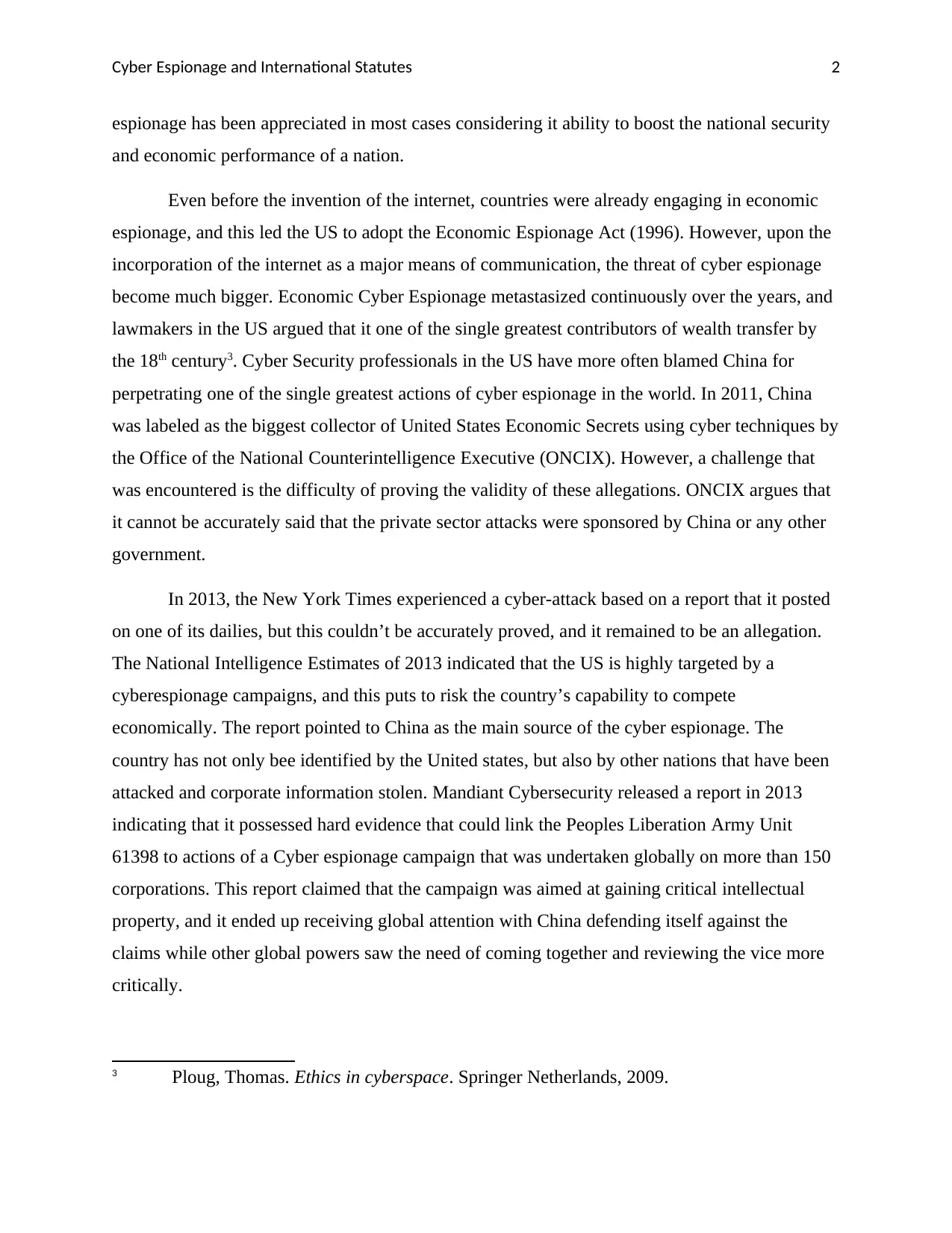
Cyber Espionage and International Statutes 2
espionage has been appreciated in most cases considering it ability to boost the national security
and economic performance of a nation.
Even before the invention of the internet, countries were already engaging in economic
espionage, and this led the US to adopt the Economic Espionage Act (1996). However, upon the
incorporation of the internet as a major means of communication, the threat of cyber espionage
become much bigger. Economic Cyber Espionage metastasized continuously over the years, and
lawmakers in the US argued that it one of the single greatest contributors of wealth transfer by
the 18th century3. Cyber Security professionals in the US have more often blamed China for
perpetrating one of the single greatest actions of cyber espionage in the world. In 2011, China
was labeled as the biggest collector of United States Economic Secrets using cyber techniques by
the Office of the National Counterintelligence Executive (ONCIX). However, a challenge that
was encountered is the difficulty of proving the validity of these allegations. ONCIX argues that
it cannot be accurately said that the private sector attacks were sponsored by China or any other
government.
In 2013, the New York Times experienced a cyber-attack based on a report that it posted
on one of its dailies, but this couldn’t be accurately proved, and it remained to be an allegation.
The National Intelligence Estimates of 2013 indicated that the US is highly targeted by a
cyberespionage campaigns, and this puts to risk the country’s capability to compete
economically. The report pointed to China as the main source of the cyber espionage. The
country has not only bee identified by the United states, but also by other nations that have been
attacked and corporate information stolen. Mandiant Cybersecurity released a report in 2013
indicating that it possessed hard evidence that could link the Peoples Liberation Army Unit
61398 to actions of a Cyber espionage campaign that was undertaken globally on more than 150
corporations. This report claimed that the campaign was aimed at gaining critical intellectual
property, and it ended up receiving global attention with China defending itself against the
claims while other global powers saw the need of coming together and reviewing the vice more
critically.
3 Ploug, Thomas. Ethics in cyberspace. Springer Netherlands, 2009.
espionage has been appreciated in most cases considering it ability to boost the national security
and economic performance of a nation.
Even before the invention of the internet, countries were already engaging in economic
espionage, and this led the US to adopt the Economic Espionage Act (1996). However, upon the
incorporation of the internet as a major means of communication, the threat of cyber espionage
become much bigger. Economic Cyber Espionage metastasized continuously over the years, and
lawmakers in the US argued that it one of the single greatest contributors of wealth transfer by
the 18th century3. Cyber Security professionals in the US have more often blamed China for
perpetrating one of the single greatest actions of cyber espionage in the world. In 2011, China
was labeled as the biggest collector of United States Economic Secrets using cyber techniques by
the Office of the National Counterintelligence Executive (ONCIX). However, a challenge that
was encountered is the difficulty of proving the validity of these allegations. ONCIX argues that
it cannot be accurately said that the private sector attacks were sponsored by China or any other
government.
In 2013, the New York Times experienced a cyber-attack based on a report that it posted
on one of its dailies, but this couldn’t be accurately proved, and it remained to be an allegation.
The National Intelligence Estimates of 2013 indicated that the US is highly targeted by a
cyberespionage campaigns, and this puts to risk the country’s capability to compete
economically. The report pointed to China as the main source of the cyber espionage. The
country has not only bee identified by the United states, but also by other nations that have been
attacked and corporate information stolen. Mandiant Cybersecurity released a report in 2013
indicating that it possessed hard evidence that could link the Peoples Liberation Army Unit
61398 to actions of a Cyber espionage campaign that was undertaken globally on more than 150
corporations. This report claimed that the campaign was aimed at gaining critical intellectual
property, and it ended up receiving global attention with China defending itself against the
claims while other global powers saw the need of coming together and reviewing the vice more
critically.
3 Ploug, Thomas. Ethics in cyberspace. Springer Netherlands, 2009.
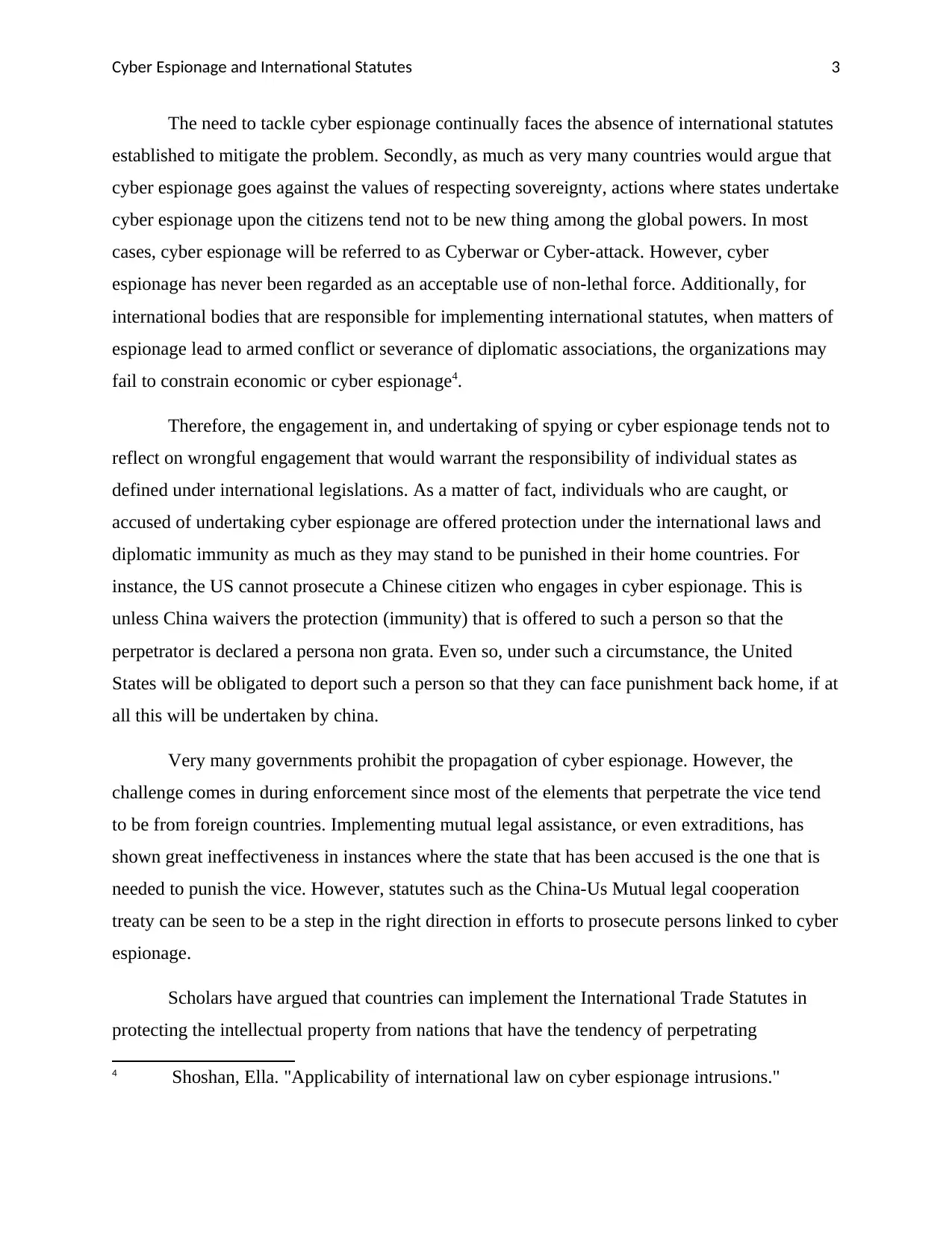
Cyber Espionage and International Statutes 3
The need to tackle cyber espionage continually faces the absence of international statutes
established to mitigate the problem. Secondly, as much as very many countries would argue that
cyber espionage goes against the values of respecting sovereignty, actions where states undertake
cyber espionage upon the citizens tend not to be new thing among the global powers. In most
cases, cyber espionage will be referred to as Cyberwar or Cyber-attack. However, cyber
espionage has never been regarded as an acceptable use of non-lethal force. Additionally, for
international bodies that are responsible for implementing international statutes, when matters of
espionage lead to armed conflict or severance of diplomatic associations, the organizations may
fail to constrain economic or cyber espionage4.
Therefore, the engagement in, and undertaking of spying or cyber espionage tends not to
reflect on wrongful engagement that would warrant the responsibility of individual states as
defined under international legislations. As a matter of fact, individuals who are caught, or
accused of undertaking cyber espionage are offered protection under the international laws and
diplomatic immunity as much as they may stand to be punished in their home countries. For
instance, the US cannot prosecute a Chinese citizen who engages in cyber espionage. This is
unless China waivers the protection (immunity) that is offered to such a person so that the
perpetrator is declared a persona non grata. Even so, under such a circumstance, the United
States will be obligated to deport such a person so that they can face punishment back home, if at
all this will be undertaken by china.
Very many governments prohibit the propagation of cyber espionage. However, the
challenge comes in during enforcement since most of the elements that perpetrate the vice tend
to be from foreign countries. Implementing mutual legal assistance, or even extraditions, has
shown great ineffectiveness in instances where the state that has been accused is the one that is
needed to punish the vice. However, statutes such as the China-Us Mutual legal cooperation
treaty can be seen to be a step in the right direction in efforts to prosecute persons linked to cyber
espionage.
Scholars have argued that countries can implement the International Trade Statutes in
protecting the intellectual property from nations that have the tendency of perpetrating
4 Shoshan, Ella. "Applicability of international law on cyber espionage intrusions."
The need to tackle cyber espionage continually faces the absence of international statutes
established to mitigate the problem. Secondly, as much as very many countries would argue that
cyber espionage goes against the values of respecting sovereignty, actions where states undertake
cyber espionage upon the citizens tend not to be new thing among the global powers. In most
cases, cyber espionage will be referred to as Cyberwar or Cyber-attack. However, cyber
espionage has never been regarded as an acceptable use of non-lethal force. Additionally, for
international bodies that are responsible for implementing international statutes, when matters of
espionage lead to armed conflict or severance of diplomatic associations, the organizations may
fail to constrain economic or cyber espionage4.
Therefore, the engagement in, and undertaking of spying or cyber espionage tends not to
reflect on wrongful engagement that would warrant the responsibility of individual states as
defined under international legislations. As a matter of fact, individuals who are caught, or
accused of undertaking cyber espionage are offered protection under the international laws and
diplomatic immunity as much as they may stand to be punished in their home countries. For
instance, the US cannot prosecute a Chinese citizen who engages in cyber espionage. This is
unless China waivers the protection (immunity) that is offered to such a person so that the
perpetrator is declared a persona non grata. Even so, under such a circumstance, the United
States will be obligated to deport such a person so that they can face punishment back home, if at
all this will be undertaken by china.
Very many governments prohibit the propagation of cyber espionage. However, the
challenge comes in during enforcement since most of the elements that perpetrate the vice tend
to be from foreign countries. Implementing mutual legal assistance, or even extraditions, has
shown great ineffectiveness in instances where the state that has been accused is the one that is
needed to punish the vice. However, statutes such as the China-Us Mutual legal cooperation
treaty can be seen to be a step in the right direction in efforts to prosecute persons linked to cyber
espionage.
Scholars have argued that countries can implement the International Trade Statutes in
protecting the intellectual property from nations that have the tendency of perpetrating
4 Shoshan, Ella. "Applicability of international law on cyber espionage intrusions."
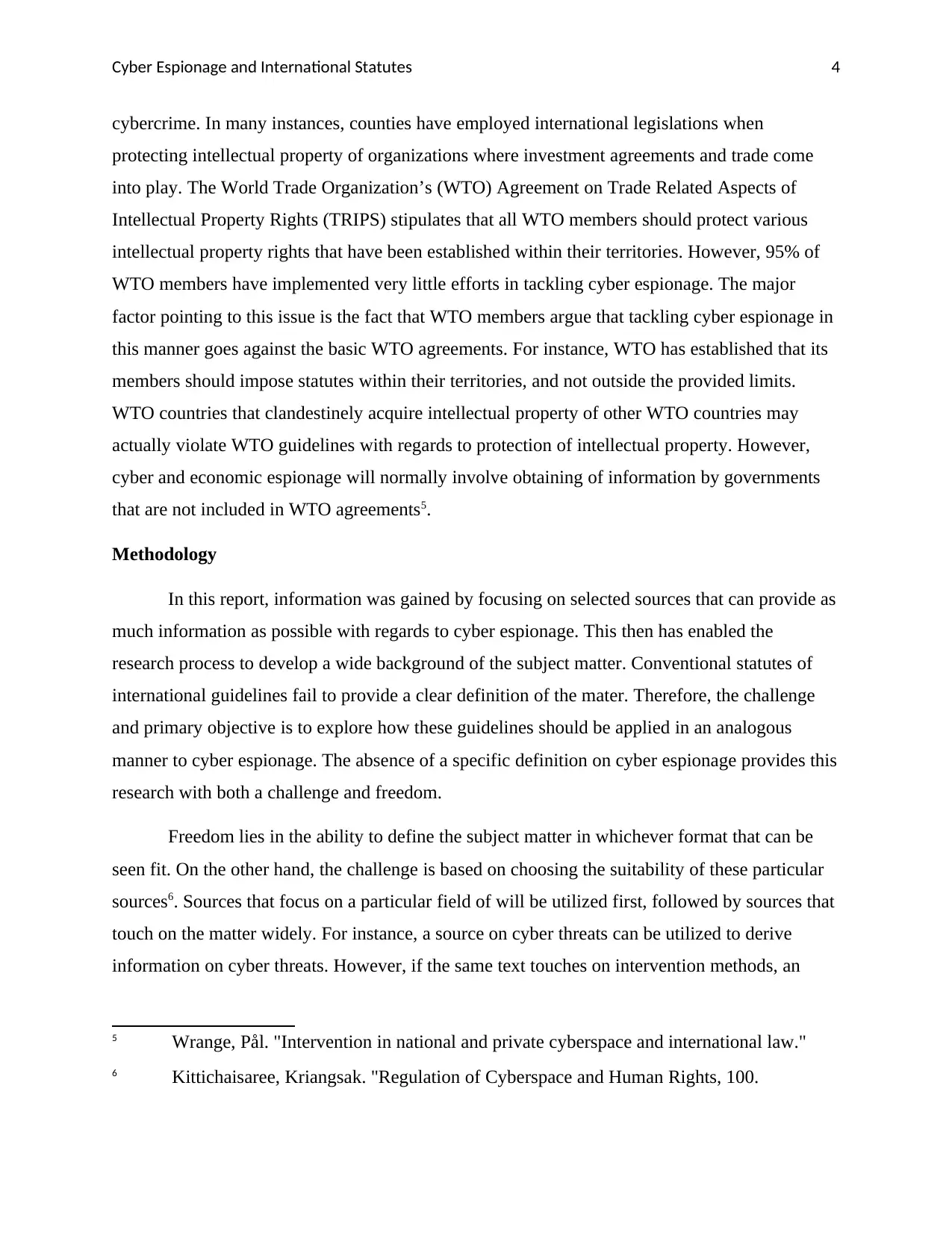
Cyber Espionage and International Statutes 4
cybercrime. In many instances, counties have employed international legislations when
protecting intellectual property of organizations where investment agreements and trade come
into play. The World Trade Organization’s (WTO) Agreement on Trade Related Aspects of
Intellectual Property Rights (TRIPS) stipulates that all WTO members should protect various
intellectual property rights that have been established within their territories. However, 95% of
WTO members have implemented very little efforts in tackling cyber espionage. The major
factor pointing to this issue is the fact that WTO members argue that tackling cyber espionage in
this manner goes against the basic WTO agreements. For instance, WTO has established that its
members should impose statutes within their territories, and not outside the provided limits.
WTO countries that clandestinely acquire intellectual property of other WTO countries may
actually violate WTO guidelines with regards to protection of intellectual property. However,
cyber and economic espionage will normally involve obtaining of information by governments
that are not included in WTO agreements5.
Methodology
In this report, information was gained by focusing on selected sources that can provide as
much information as possible with regards to cyber espionage. This then has enabled the
research process to develop a wide background of the subject matter. Conventional statutes of
international guidelines fail to provide a clear definition of the mater. Therefore, the challenge
and primary objective is to explore how these guidelines should be applied in an analogous
manner to cyber espionage. The absence of a specific definition on cyber espionage provides this
research with both a challenge and freedom.
Freedom lies in the ability to define the subject matter in whichever format that can be
seen fit. On the other hand, the challenge is based on choosing the suitability of these particular
sources6. Sources that focus on a particular field of will be utilized first, followed by sources that
touch on the matter widely. For instance, a source on cyber threats can be utilized to derive
information on cyber threats. However, if the same text touches on intervention methods, an
5 Wrange, Pål. "Intervention in national and private cyberspace and international law."
6 Kittichaisaree, Kriangsak. "Regulation of Cyberspace and Human Rights, 100.
cybercrime. In many instances, counties have employed international legislations when
protecting intellectual property of organizations where investment agreements and trade come
into play. The World Trade Organization’s (WTO) Agreement on Trade Related Aspects of
Intellectual Property Rights (TRIPS) stipulates that all WTO members should protect various
intellectual property rights that have been established within their territories. However, 95% of
WTO members have implemented very little efforts in tackling cyber espionage. The major
factor pointing to this issue is the fact that WTO members argue that tackling cyber espionage in
this manner goes against the basic WTO agreements. For instance, WTO has established that its
members should impose statutes within their territories, and not outside the provided limits.
WTO countries that clandestinely acquire intellectual property of other WTO countries may
actually violate WTO guidelines with regards to protection of intellectual property. However,
cyber and economic espionage will normally involve obtaining of information by governments
that are not included in WTO agreements5.
Methodology
In this report, information was gained by focusing on selected sources that can provide as
much information as possible with regards to cyber espionage. This then has enabled the
research process to develop a wide background of the subject matter. Conventional statutes of
international guidelines fail to provide a clear definition of the mater. Therefore, the challenge
and primary objective is to explore how these guidelines should be applied in an analogous
manner to cyber espionage. The absence of a specific definition on cyber espionage provides this
research with both a challenge and freedom.
Freedom lies in the ability to define the subject matter in whichever format that can be
seen fit. On the other hand, the challenge is based on choosing the suitability of these particular
sources6. Sources that focus on a particular field of will be utilized first, followed by sources that
touch on the matter widely. For instance, a source on cyber threats can be utilized to derive
information on cyber threats. However, if the same text touches on intervention methods, an
5 Wrange, Pål. "Intervention in national and private cyberspace and international law."
6 Kittichaisaree, Kriangsak. "Regulation of Cyberspace and Human Rights, 100.
Secure Best Marks with AI Grader
Need help grading? Try our AI Grader for instant feedback on your assignments.
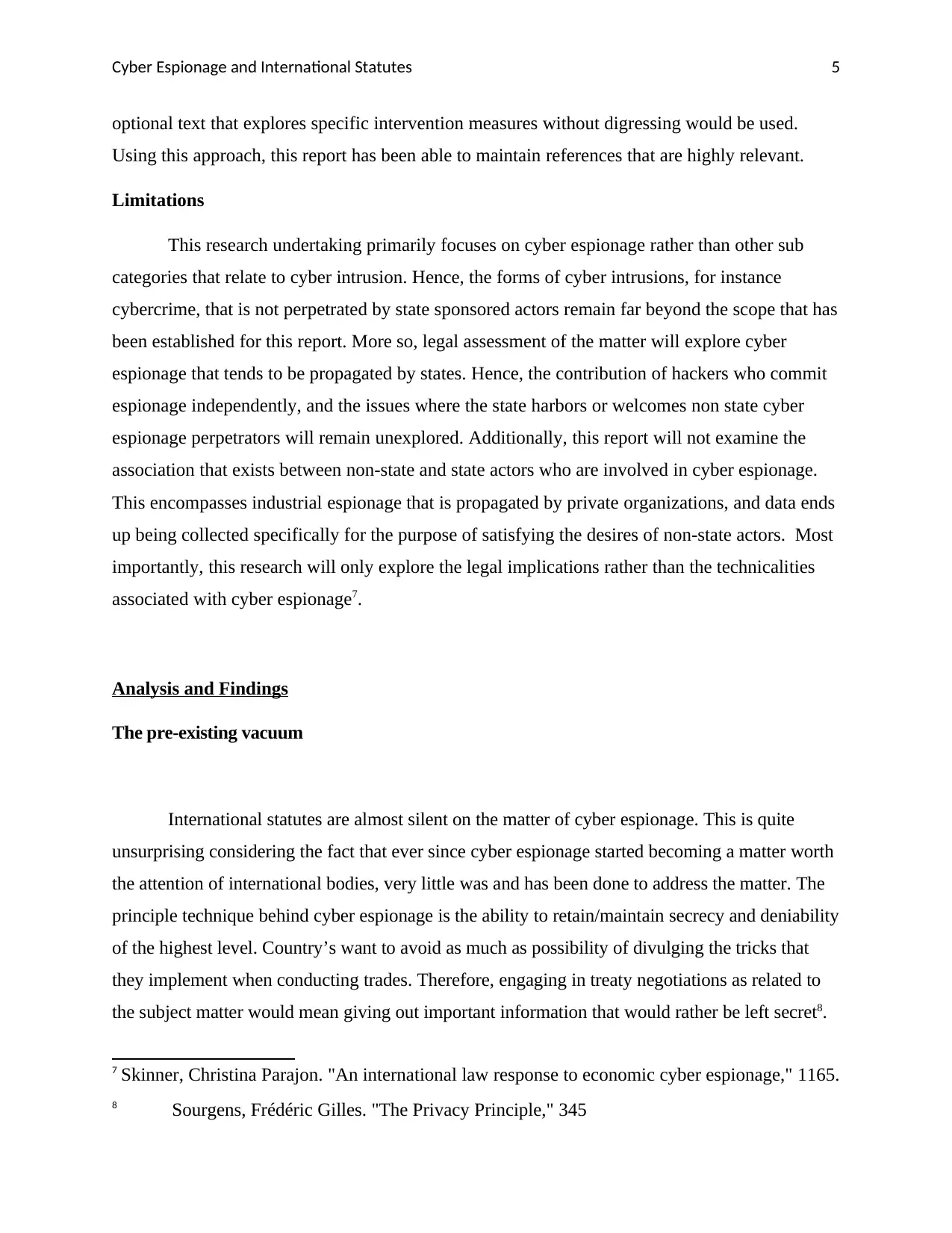
Cyber Espionage and International Statutes 5
optional text that explores specific intervention measures without digressing would be used.
Using this approach, this report has been able to maintain references that are highly relevant.
Limitations
This research undertaking primarily focuses on cyber espionage rather than other sub
categories that relate to cyber intrusion. Hence, the forms of cyber intrusions, for instance
cybercrime, that is not perpetrated by state sponsored actors remain far beyond the scope that has
been established for this report. More so, legal assessment of the matter will explore cyber
espionage that tends to be propagated by states. Hence, the contribution of hackers who commit
espionage independently, and the issues where the state harbors or welcomes non state cyber
espionage perpetrators will remain unexplored. Additionally, this report will not examine the
association that exists between non-state and state actors who are involved in cyber espionage.
This encompasses industrial espionage that is propagated by private organizations, and data ends
up being collected specifically for the purpose of satisfying the desires of non-state actors. Most
importantly, this research will only explore the legal implications rather than the technicalities
associated with cyber espionage7.
Analysis and Findings
The pre-existing vacuum
International statutes are almost silent on the matter of cyber espionage. This is quite
unsurprising considering the fact that ever since cyber espionage started becoming a matter worth
the attention of international bodies, very little was and has been done to address the matter. The
principle technique behind cyber espionage is the ability to retain/maintain secrecy and deniability
of the highest level. Country’s want to avoid as much as possibility of divulging the tricks that
they implement when conducting trades. Therefore, engaging in treaty negotiations as related to
the subject matter would mean giving out important information that would rather be left secret8.
7 Skinner, Christina Parajon. "An international law response to economic cyber espionage," 1165.
8 Sourgens, Frédéric Gilles. "The Privacy Principle," 345
optional text that explores specific intervention measures without digressing would be used.
Using this approach, this report has been able to maintain references that are highly relevant.
Limitations
This research undertaking primarily focuses on cyber espionage rather than other sub
categories that relate to cyber intrusion. Hence, the forms of cyber intrusions, for instance
cybercrime, that is not perpetrated by state sponsored actors remain far beyond the scope that has
been established for this report. More so, legal assessment of the matter will explore cyber
espionage that tends to be propagated by states. Hence, the contribution of hackers who commit
espionage independently, and the issues where the state harbors or welcomes non state cyber
espionage perpetrators will remain unexplored. Additionally, this report will not examine the
association that exists between non-state and state actors who are involved in cyber espionage.
This encompasses industrial espionage that is propagated by private organizations, and data ends
up being collected specifically for the purpose of satisfying the desires of non-state actors. Most
importantly, this research will only explore the legal implications rather than the technicalities
associated with cyber espionage7.
Analysis and Findings
The pre-existing vacuum
International statutes are almost silent on the matter of cyber espionage. This is quite
unsurprising considering the fact that ever since cyber espionage started becoming a matter worth
the attention of international bodies, very little was and has been done to address the matter. The
principle technique behind cyber espionage is the ability to retain/maintain secrecy and deniability
of the highest level. Country’s want to avoid as much as possibility of divulging the tricks that
they implement when conducting trades. Therefore, engaging in treaty negotiations as related to
the subject matter would mean giving out important information that would rather be left secret8.
7 Skinner, Christina Parajon. "An international law response to economic cyber espionage," 1165.
8 Sourgens, Frédéric Gilles. "The Privacy Principle," 345
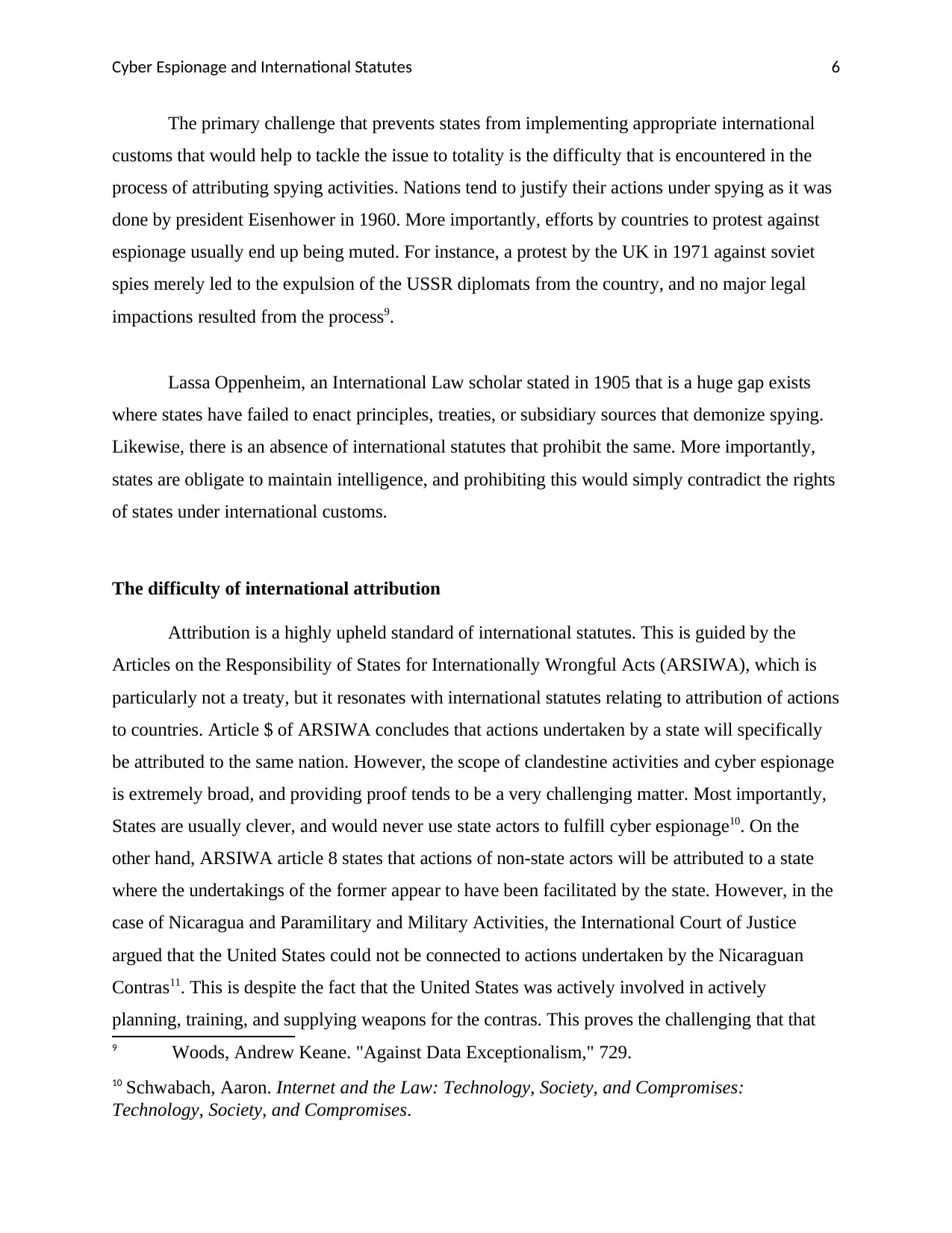
Cyber Espionage and International Statutes 6
The primary challenge that prevents states from implementing appropriate international
customs that would help to tackle the issue to totality is the difficulty that is encountered in the
process of attributing spying activities. Nations tend to justify their actions under spying as it was
done by president Eisenhower in 1960. More importantly, efforts by countries to protest against
espionage usually end up being muted. For instance, a protest by the UK in 1971 against soviet
spies merely led to the expulsion of the USSR diplomats from the country, and no major legal
impactions resulted from the process9.
Lassa Oppenheim, an International Law scholar stated in 1905 that is a huge gap exists
where states have failed to enact principles, treaties, or subsidiary sources that demonize spying.
Likewise, there is an absence of international statutes that prohibit the same. More importantly,
states are obligate to maintain intelligence, and prohibiting this would simply contradict the rights
of states under international customs.
The difficulty of international attribution
Attribution is a highly upheld standard of international statutes. This is guided by the
Articles on the Responsibility of States for Internationally Wrongful Acts (ARSIWA), which is
particularly not a treaty, but it resonates with international statutes relating to attribution of actions
to countries. Article $ of ARSIWA concludes that actions undertaken by a state will specifically
be attributed to the same nation. However, the scope of clandestine activities and cyber espionage
is extremely broad, and providing proof tends to be a very challenging matter. Most importantly,
States are usually clever, and would never use state actors to fulfill cyber espionage10. On the
other hand, ARSIWA article 8 states that actions of non-state actors will be attributed to a state
where the undertakings of the former appear to have been facilitated by the state. However, in the
case of Nicaragua and Paramilitary and Military Activities, the International Court of Justice
argued that the United States could not be connected to actions undertaken by the Nicaraguan
Contras11. This is despite the fact that the United States was actively involved in actively
planning, training, and supplying weapons for the contras. This proves the challenging that that
9 Woods, Andrew Keane. "Against Data Exceptionalism," 729.
10 Schwabach, Aaron. Internet and the Law: Technology, Society, and Compromises:
Technology, Society, and Compromises.
The primary challenge that prevents states from implementing appropriate international
customs that would help to tackle the issue to totality is the difficulty that is encountered in the
process of attributing spying activities. Nations tend to justify their actions under spying as it was
done by president Eisenhower in 1960. More importantly, efforts by countries to protest against
espionage usually end up being muted. For instance, a protest by the UK in 1971 against soviet
spies merely led to the expulsion of the USSR diplomats from the country, and no major legal
impactions resulted from the process9.
Lassa Oppenheim, an International Law scholar stated in 1905 that is a huge gap exists
where states have failed to enact principles, treaties, or subsidiary sources that demonize spying.
Likewise, there is an absence of international statutes that prohibit the same. More importantly,
states are obligate to maintain intelligence, and prohibiting this would simply contradict the rights
of states under international customs.
The difficulty of international attribution
Attribution is a highly upheld standard of international statutes. This is guided by the
Articles on the Responsibility of States for Internationally Wrongful Acts (ARSIWA), which is
particularly not a treaty, but it resonates with international statutes relating to attribution of actions
to countries. Article $ of ARSIWA concludes that actions undertaken by a state will specifically
be attributed to the same nation. However, the scope of clandestine activities and cyber espionage
is extremely broad, and providing proof tends to be a very challenging matter. Most importantly,
States are usually clever, and would never use state actors to fulfill cyber espionage10. On the
other hand, ARSIWA article 8 states that actions of non-state actors will be attributed to a state
where the undertakings of the former appear to have been facilitated by the state. However, in the
case of Nicaragua and Paramilitary and Military Activities, the International Court of Justice
argued that the United States could not be connected to actions undertaken by the Nicaraguan
Contras11. This is despite the fact that the United States was actively involved in actively
planning, training, and supplying weapons for the contras. This proves the challenging that that
9 Woods, Andrew Keane. "Against Data Exceptionalism," 729.
10 Schwabach, Aaron. Internet and the Law: Technology, Society, and Compromises:
Technology, Society, and Compromises.
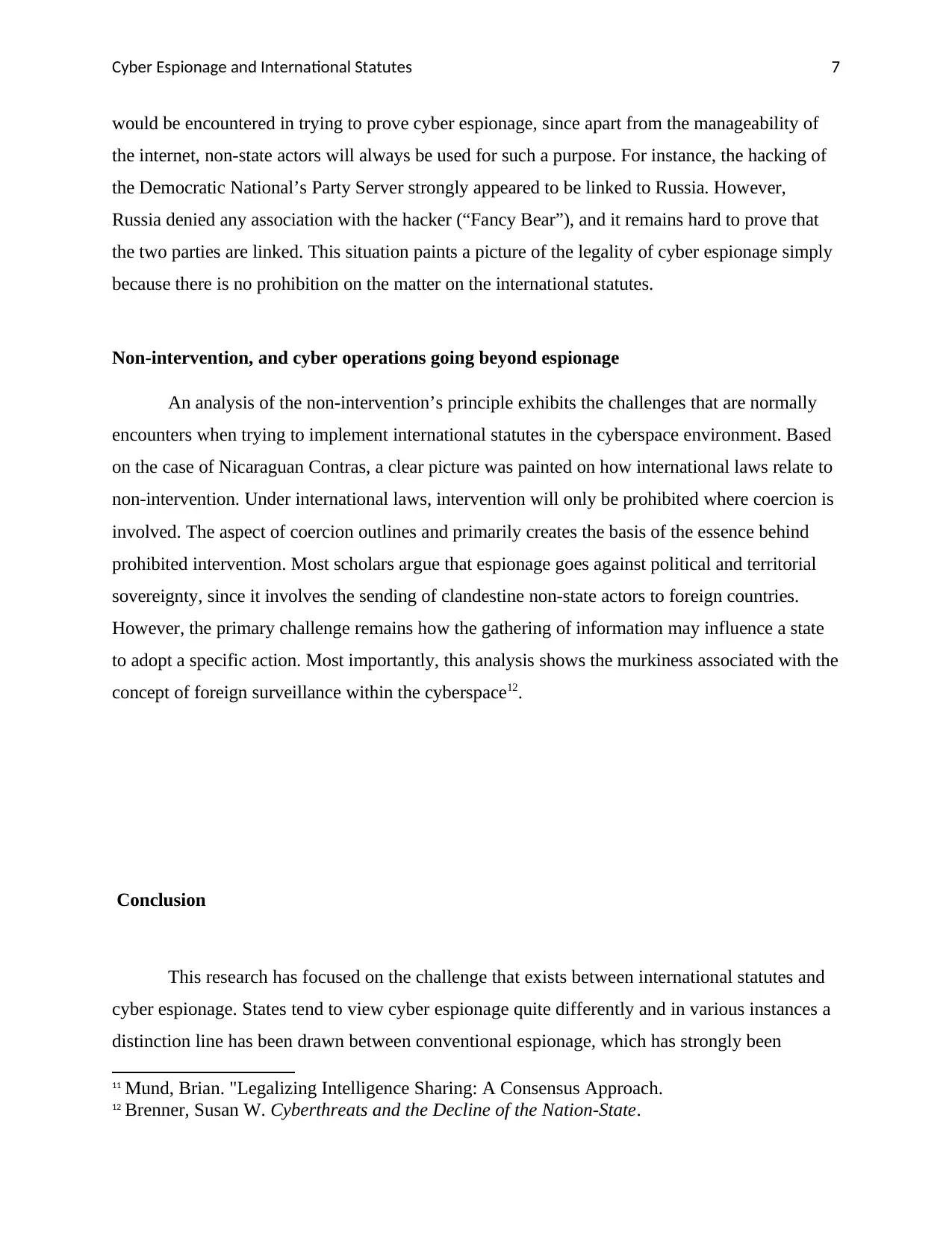
Cyber Espionage and International Statutes 7
would be encountered in trying to prove cyber espionage, since apart from the manageability of
the internet, non-state actors will always be used for such a purpose. For instance, the hacking of
the Democratic National’s Party Server strongly appeared to be linked to Russia. However,
Russia denied any association with the hacker (“Fancy Bear”), and it remains hard to prove that
the two parties are linked. This situation paints a picture of the legality of cyber espionage simply
because there is no prohibition on the matter on the international statutes.
Non-intervention, and cyber operations going beyond espionage
An analysis of the non-intervention’s principle exhibits the challenges that are normally
encounters when trying to implement international statutes in the cyberspace environment. Based
on the case of Nicaraguan Contras, a clear picture was painted on how international laws relate to
non-intervention. Under international laws, intervention will only be prohibited where coercion is
involved. The aspect of coercion outlines and primarily creates the basis of the essence behind
prohibited intervention. Most scholars argue that espionage goes against political and territorial
sovereignty, since it involves the sending of clandestine non-state actors to foreign countries.
However, the primary challenge remains how the gathering of information may influence a state
to adopt a specific action. Most importantly, this analysis shows the murkiness associated with the
concept of foreign surveillance within the cyberspace12.
Conclusion
This research has focused on the challenge that exists between international statutes and
cyber espionage. States tend to view cyber espionage quite differently and in various instances a
distinction line has been drawn between conventional espionage, which has strongly been
11 Mund, Brian. "Legalizing Intelligence Sharing: A Consensus Approach.
12 Brenner, Susan W. Cyberthreats and the Decline of the Nation-State.
would be encountered in trying to prove cyber espionage, since apart from the manageability of
the internet, non-state actors will always be used for such a purpose. For instance, the hacking of
the Democratic National’s Party Server strongly appeared to be linked to Russia. However,
Russia denied any association with the hacker (“Fancy Bear”), and it remains hard to prove that
the two parties are linked. This situation paints a picture of the legality of cyber espionage simply
because there is no prohibition on the matter on the international statutes.
Non-intervention, and cyber operations going beyond espionage
An analysis of the non-intervention’s principle exhibits the challenges that are normally
encounters when trying to implement international statutes in the cyberspace environment. Based
on the case of Nicaraguan Contras, a clear picture was painted on how international laws relate to
non-intervention. Under international laws, intervention will only be prohibited where coercion is
involved. The aspect of coercion outlines and primarily creates the basis of the essence behind
prohibited intervention. Most scholars argue that espionage goes against political and territorial
sovereignty, since it involves the sending of clandestine non-state actors to foreign countries.
However, the primary challenge remains how the gathering of information may influence a state
to adopt a specific action. Most importantly, this analysis shows the murkiness associated with the
concept of foreign surveillance within the cyberspace12.
Conclusion
This research has focused on the challenge that exists between international statutes and
cyber espionage. States tend to view cyber espionage quite differently and in various instances a
distinction line has been drawn between conventional espionage, which has strongly been
11 Mund, Brian. "Legalizing Intelligence Sharing: A Consensus Approach.
12 Brenner, Susan W. Cyberthreats and the Decline of the Nation-State.
Paraphrase This Document
Need a fresh take? Get an instant paraphrase of this document with our AI Paraphraser
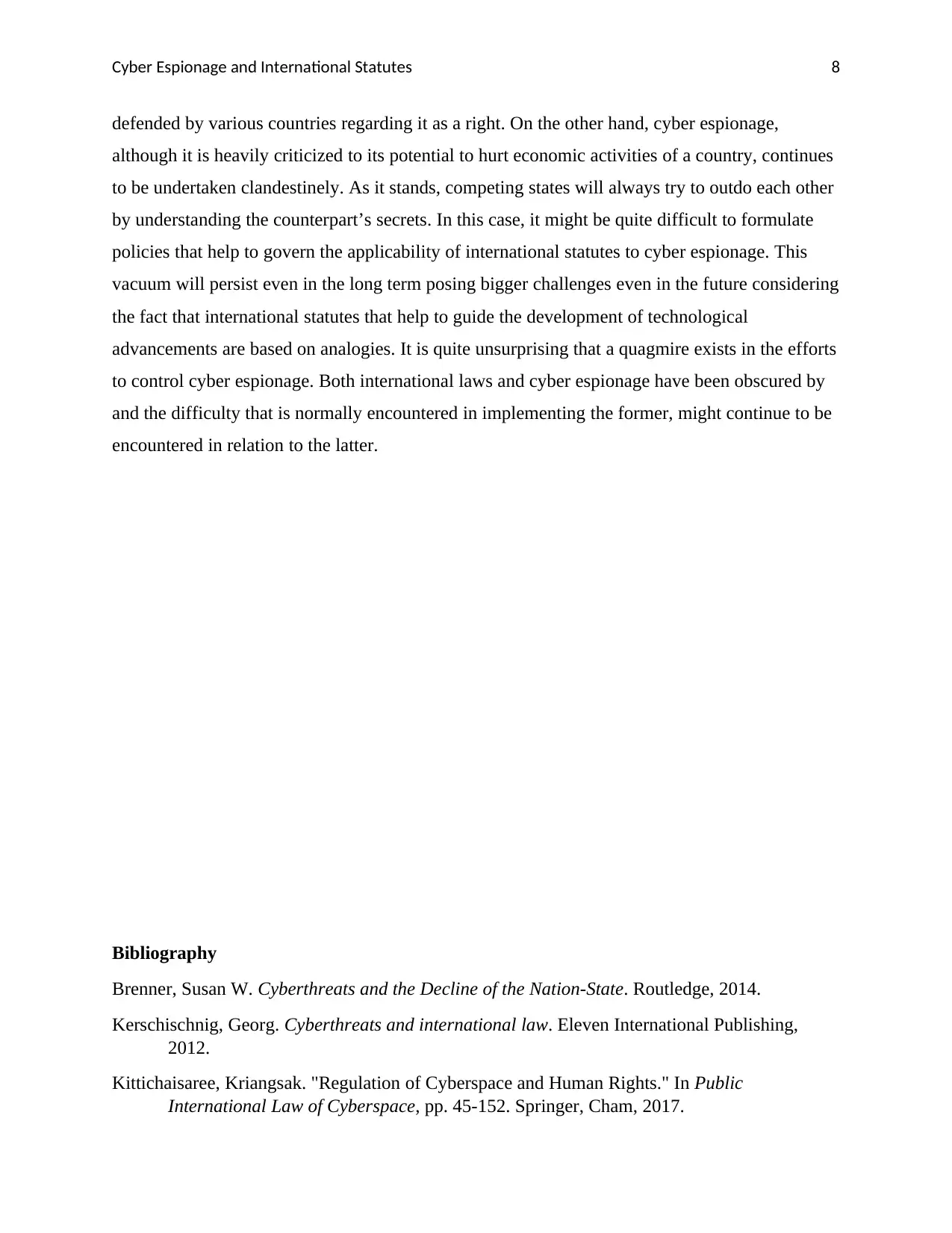
Cyber Espionage and International Statutes 8
defended by various countries regarding it as a right. On the other hand, cyber espionage,
although it is heavily criticized to its potential to hurt economic activities of a country, continues
to be undertaken clandestinely. As it stands, competing states will always try to outdo each other
by understanding the counterpart’s secrets. In this case, it might be quite difficult to formulate
policies that help to govern the applicability of international statutes to cyber espionage. This
vacuum will persist even in the long term posing bigger challenges even in the future considering
the fact that international statutes that help to guide the development of technological
advancements are based on analogies. It is quite unsurprising that a quagmire exists in the efforts
to control cyber espionage. Both international laws and cyber espionage have been obscured by
and the difficulty that is normally encountered in implementing the former, might continue to be
encountered in relation to the latter.
Bibliography
Brenner, Susan W. Cyberthreats and the Decline of the Nation-State. Routledge, 2014.
Kerschischnig, Georg. Cyberthreats and international law. Eleven International Publishing,
2012.
Kittichaisaree, Kriangsak. "Regulation of Cyberspace and Human Rights." In Public
International Law of Cyberspace, pp. 45-152. Springer, Cham, 2017.
defended by various countries regarding it as a right. On the other hand, cyber espionage,
although it is heavily criticized to its potential to hurt economic activities of a country, continues
to be undertaken clandestinely. As it stands, competing states will always try to outdo each other
by understanding the counterpart’s secrets. In this case, it might be quite difficult to formulate
policies that help to govern the applicability of international statutes to cyber espionage. This
vacuum will persist even in the long term posing bigger challenges even in the future considering
the fact that international statutes that help to guide the development of technological
advancements are based on analogies. It is quite unsurprising that a quagmire exists in the efforts
to control cyber espionage. Both international laws and cyber espionage have been obscured by
and the difficulty that is normally encountered in implementing the former, might continue to be
encountered in relation to the latter.
Bibliography
Brenner, Susan W. Cyberthreats and the Decline of the Nation-State. Routledge, 2014.
Kerschischnig, Georg. Cyberthreats and international law. Eleven International Publishing,
2012.
Kittichaisaree, Kriangsak. "Regulation of Cyberspace and Human Rights." In Public
International Law of Cyberspace, pp. 45-152. Springer, Cham, 2017.
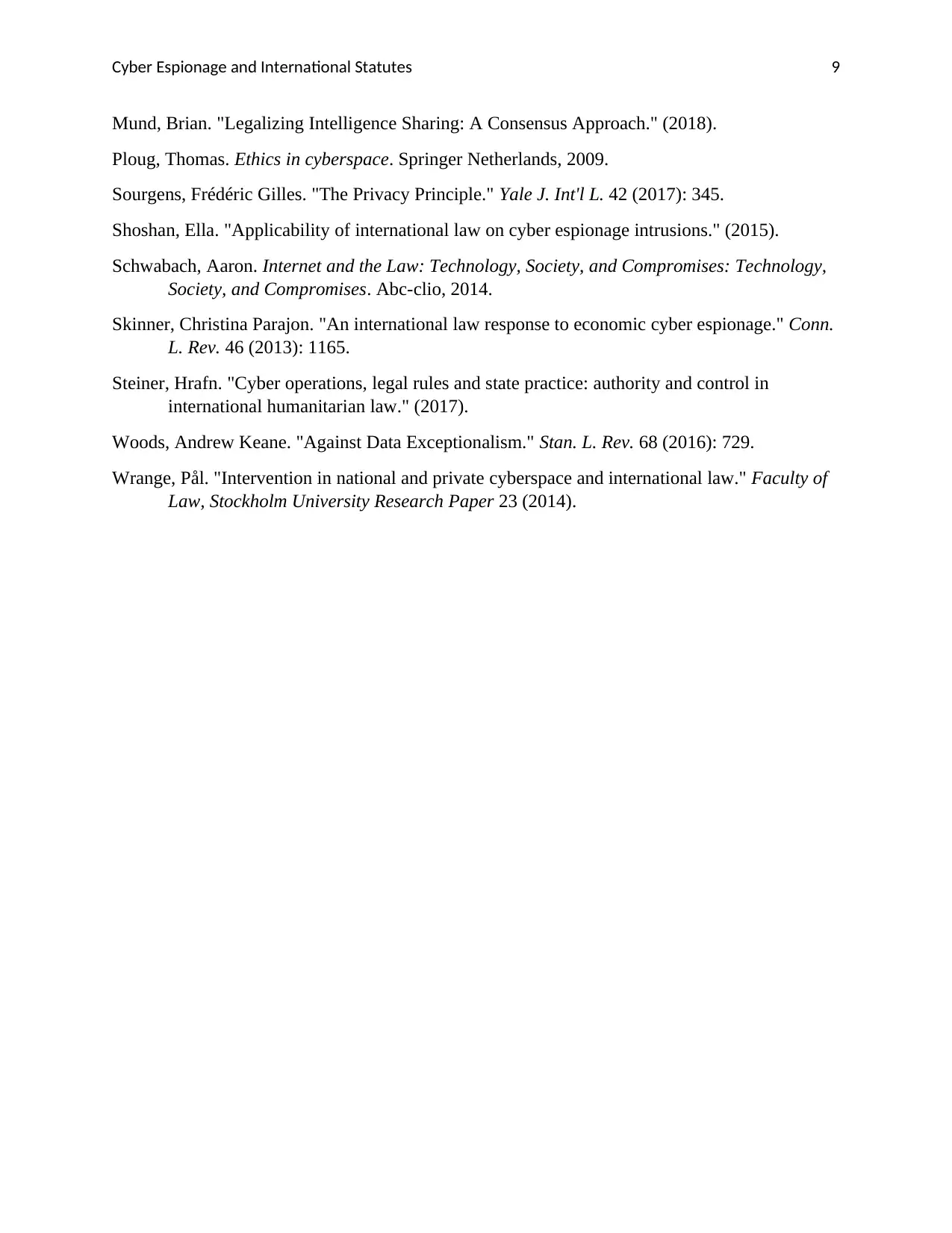
Cyber Espionage and International Statutes 9
Mund, Brian. "Legalizing Intelligence Sharing: A Consensus Approach." (2018).
Ploug, Thomas. Ethics in cyberspace. Springer Netherlands, 2009.
Sourgens, Frédéric Gilles. "The Privacy Principle." Yale J. Int'l L. 42 (2017): 345.
Shoshan, Ella. "Applicability of international law on cyber espionage intrusions." (2015).
Schwabach, Aaron. Internet and the Law: Technology, Society, and Compromises: Technology,
Society, and Compromises. Abc-clio, 2014.
Skinner, Christina Parajon. "An international law response to economic cyber espionage." Conn.
L. Rev. 46 (2013): 1165.
Steiner, Hrafn. "Cyber operations, legal rules and state practice: authority and control in
international humanitarian law." (2017).
Woods, Andrew Keane. "Against Data Exceptionalism." Stan. L. Rev. 68 (2016): 729.
Wrange, Pål. "Intervention in national and private cyberspace and international law." Faculty of
Law, Stockholm University Research Paper 23 (2014).
Mund, Brian. "Legalizing Intelligence Sharing: A Consensus Approach." (2018).
Ploug, Thomas. Ethics in cyberspace. Springer Netherlands, 2009.
Sourgens, Frédéric Gilles. "The Privacy Principle." Yale J. Int'l L. 42 (2017): 345.
Shoshan, Ella. "Applicability of international law on cyber espionage intrusions." (2015).
Schwabach, Aaron. Internet and the Law: Technology, Society, and Compromises: Technology,
Society, and Compromises. Abc-clio, 2014.
Skinner, Christina Parajon. "An international law response to economic cyber espionage." Conn.
L. Rev. 46 (2013): 1165.
Steiner, Hrafn. "Cyber operations, legal rules and state practice: authority and control in
international humanitarian law." (2017).
Woods, Andrew Keane. "Against Data Exceptionalism." Stan. L. Rev. 68 (2016): 729.
Wrange, Pål. "Intervention in national and private cyberspace and international law." Faculty of
Law, Stockholm University Research Paper 23 (2014).
1 out of 9
Related Documents
Your All-in-One AI-Powered Toolkit for Academic Success.
+13062052269
info@desklib.com
Available 24*7 on WhatsApp / Email
![[object Object]](/_next/static/media/star-bottom.7253800d.svg)
Unlock your academic potential
© 2024 | Zucol Services PVT LTD | All rights reserved.
